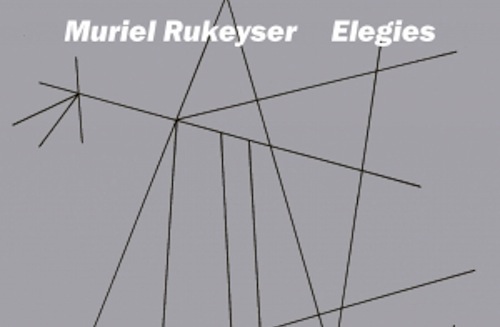Now at New Directions: Introducing Muriel Rukeyser's Elegies

At the New Directions blog: the introduction to Muriel Rukeyser's Elegies, which ND has just reprinted! Originally published in 1949, the Elegies "were written over a seven-year period from the end of the Spanish Civil War, through World War II, Hiroshima, and Nagasaki, to the start of the Cold War. Both an homage to Rilke’s Duino Elegies and a spiritual reckoning that is particularly resonant today, these poems present no angelic orders. . . ." From the introduction, written by scholars Jan Heller Levi and Christoph Keller, who are currently at work on a Rukeyser biography:
. . .These poems, though rooted in key events of the decade in which they were written, are not reportage, not agitprop, not antiwar sloganeering. Rather, they are a profound poetic meditation on the sources of violence and love in our lives, and mark out the intersections — Rukeyser called these “meeting-places” — where such conflicting desires create new possibilities. In a world of upheaval, when survival seems the only course, these are poems of transformation.
ii.
In the summer of 1936, the twenty-two-year-old author of a groundbreaking first book, Theory of Flight, was asked by the London cultural journal Life and Letters Today to cover the People’s Olympiad in Barcelona, the antifacist alternative to the official Olympics in Berlin. Just past the town of Moncada, fifteen miles from Barcelona, Muriel Rukeyser’s train ground to a halt amid shooting. Instead of arriving for the opening of the peaceful games, she found herself thrown into the first fighting of the Spanish Civil War.
Also on the train was an earnest young man from Germany named Otto Boch, a carpenter by trade but also a runner, on his way to Barcelona to compete in the Olympiad. Surrounded by the cruel soundtrack of gunfire and sirens, as Franco set his forces against the people of Spain, these two young people became lovers. Together they witnessed the beginnings of the Fascist will to power in Europe, and they recognized that they must take action. Boch remained to fight for the Republican cause. Five days later, Rukeyser was evacuated with other refugees, and returned to New York, where she worked for the American Medical Bureau to Aid Spanish Democracy. Boch’s letters to her ceased to arrive after 1938; still, she held out hope that he had not perished.
Rukeyser was later to call her five days in Spain a "stroke of insight,” the moment when she understood creative responsibility. “Then I began to say what I believe,” she wrote in her introduction to The Life of Poetry.
iii.
Rilke’s famous Duino Elegies, also a cycle of ten poems, appeared in the U. S. in a new translation by Stephen Spender and J. B. Leishman in 1939. Rukeyser, who read German, was already deeply familiar with them — they were a key inspiration for her work.
Rilke began his elegies in 1912, two years before Gavrila Prinzip’s bullet toppled the tenuous order of Europe, though they wouldn’t be completed until a decade later. “Prinzip’s year bore us,” Rukeyser wrote of her generation in “Poem Out of Childhood,” “see us turning at breast / quietly while the air throbs over Sarajevo.” In Trieste, the cosmopolitan port city of the Austrian Empire near Duino Castle, where Rilke was staying, the last pre-dreadnought battleships were being constructed and christened for a war that was sure to come.
Who, if I cried, would hear me among the angelic orders?
*
Strange, not to go on wishing one’s wishes. Strange, to see all that was once relation so
loosely fluttering hither and thither in space.— Rilke, First Elegy
Rukeyser began her elegies in New York in 1939, still hoping for word from her beloved in Spain. Barcelona and Madrid had already fallen, and it was likely Boch had fallen, too. Then Russia and Germany signed the devastating pact that spelled doom for Europe. From the window of her parents' apartment, she could see the Navy’s new aircraft carriers and destroyers being launched on the Hudson River. As she had gone down to that river many times in her youth, now she goes down to “Rotten Lake,” as she titled her first elegy, to discover
what must be crossed and cut out of your heart,
what must be stood beside and straightly seen.*
Dare it arrive, the day when weakness ends?
When the insistence is strong, the wish converted?
I prophesy the meeting by the water
of these desires.— First Elegy. Rotten Lake


